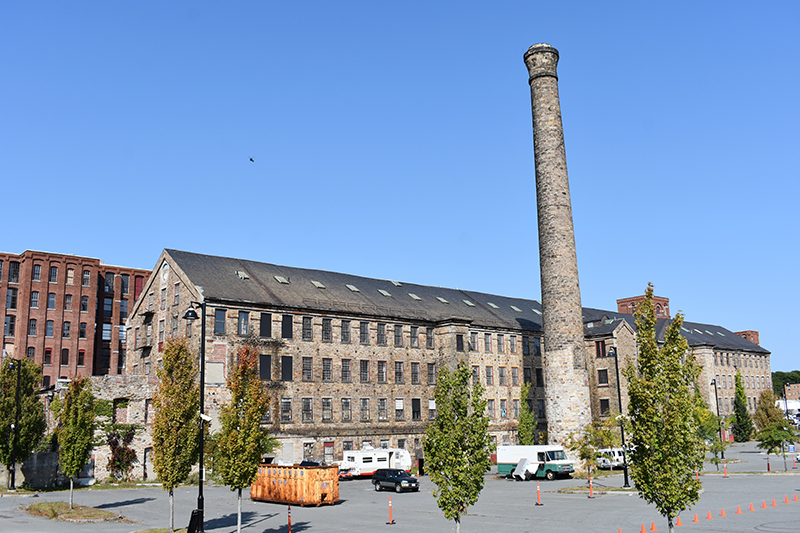WinnDevelopment’s Stone Mill project receives financing approval
Lawrence, MA WinnCompanies has received the financing commitments needed to acquire and renovate The Stone Mill, built 176 years ago by the founder of the city, into 86 apartments serving families and individuals across a range of income levels.
The company’s development arm, WinnDevelopment, plans to begin construction early in 2022 on the $34 million historic adaptive reuse project, which will preserve, restore and transform the 149,220 s/f structure erected by the city’s namesake, Abbot Lawrence, on the edge of what is now the downtown business district.
“We believe the redevelopment of The Stone Mill is a transformational project that will be a key driver for economic development at the eastern end of the Essex St. corridor, which serves as the hub and spoke of downtown Lawrence,” said Larry Curtis, president and managing partner of WinnDevelopment. “The city of Lawrence was built around this building in the 19th century, and it will prove instrumental once again, thanks to a great partnership with city leadership and enthusiastic support from state housing officials.”
“Having accessible housing options in Lawrence is a necessity for our community members and their well-being. Safe and affordable housing is vital for our residents to thrive,” mayor Kendrys Vasquez said. “I trust that WinnCompanies will take care of this piece of Lawrence history and take care of the 86 families and individuals that will be moving into these units in due time. This partnership will provide the people of Lawrence with opportunities to deepen their roots in the city that they love.”
The final piece of the project’s funding puzzle fell into place on October 15 when the Baker Administration announced that the Department of Housing and Community Development (DHCD) will support the project with federal and state low-income housing tax credits and subsidy funds as part of an effort to support the rehabilitation and production of 678 units of rental housing across Mass.
“To truly address our housing crisis here in Massachusetts, we need more housing of all types across the Commonwealth, and these projects – with strong local support and experienced development teams – point to meaningful progress in our strategy to address this crisis head on,” said secretary of Housing and Economic Development Mike Kennealy. “I want to congratulate the project teams and their partner communities for their collaboration on these projects that will produce more needed housing, help reinvigorate their downtowns, and support our economic recovery, especially in communities that were disproportionately impacted by the COVID-19 public health crisis.”
The Stone Mill project will bring badly needed affordable housing to the city. Sixty-nine of the apartments will be available to residents with income at or below 60% of Area Median Income (AMI), including 11 units for households earning below 30% of AMI. The remaining 17 apartments will be rented at market rates. The completed project will include 28 two-bedroom two-bath units and eight three-bedroom two-bath units.
The history of the mill begins in 1845 when Abbot Lawrence purchased rural farmland on the banks of the Merrimack River with the vision of harnessing water to power textile mills. The Essex Company Machine Shop – known today as The Stone Mill – was the first building erected along the canal for the purpose of manufacturing tools, mill machinery, water turbines and millwork for the planned textile factories that would fuel America’s Industrial Revolution.
By 1853, the fast-growing community was incorporated as a city with Mr. Lawrence as its namesake. He later served as a Massachusetts congressman and as U.S. Ambassador to Great Britain.
WinnDevelopment, working with its longtime design partner, The Architectural Team, will not only preserve and restore the historic features of the four-story building, but also install all-electric, high efficiency systems that will dramatically reduce the development’s long-term carbon footprint.
In addition to the project’s extraordinary environmental commitments, Stone Mill’s redevelopment will support local workforce development, with at least 30% of all construction work performed by minority and women-owned businesses as well as skilled labor from the area.
The 2.3-acre site is located less than a half mile from the Haverhill MBTA station; less than a quarter mile from the city’s Riverwalk, two public parks and schools; 800 feet from Lawrence General Hospital; and 150 feet from Everett Mill, a commercial building featuring more than 70 local businesses.
Construction is expected to take 16 months once work begins in the first quarter of 2022. Financing sources include the DHCD, the Massachusetts Historical Commission, the U.S. National Park Service, MassHousing, City of Lawrence HOME funds and Bank of America.
The project will be WinnDevelopment’s third adaptive reuse development to revive a historic mill in Lawrence, following the successful transformation of two former Malden Mills buildings to create the award-winning LoftFive50 complex, which features 137 units of affordable housing. No other developer has won more awards for the adaptive reuse of vacant, historic structures to create residential apartment communities.
Newmark negotiates sale of 10 Liberty Sq. and 12 Post Office Sq.


Five ways to ruin a Section 1031 Like-Kind Exchange - by Bill Lopriore

Make PR pop by highlighting unique angles - by Stanley Hurwitz

Four tips for a smooth 1031 Exchange - by Bill Lopriore









